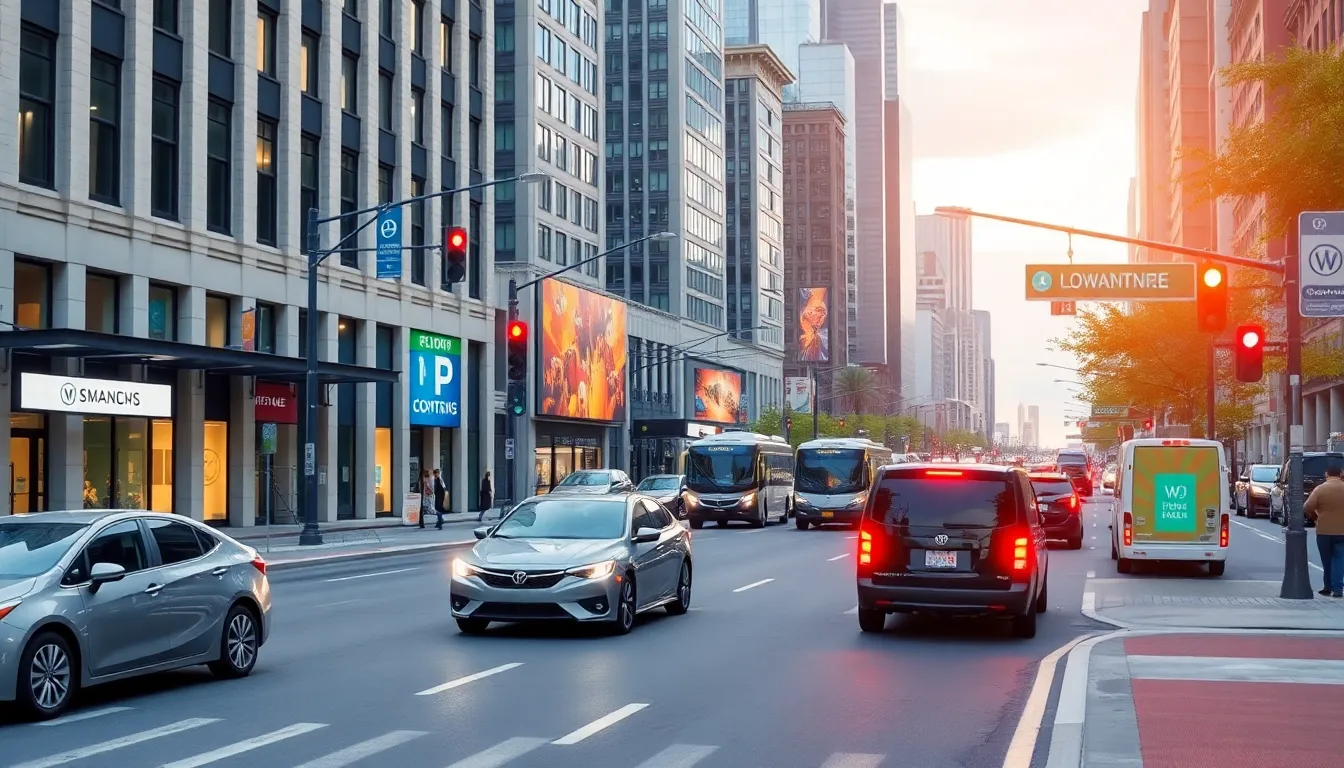Imagine a world where your car knows the fastest route before you even step inside. Smart transportation isn’t just a futuristic dream—it’s quickly becoming a reality. With technology evolving faster than a cheetah on roller skates, cities are embracing innovations that promise to make commuting smoother, safer, and a lot less stressful.
From self-driving cars to intelligent traffic systems, smart transportation is reshaping how people move. It’s not just about getting from point A to point B anymore; it’s about doing it in style, comfort, and with a sprinkle of tech magic. So buckle up as we dive into this exciting realm where convenience meets cutting-edge technology, and discover how smart transportation is set to revolutionize our daily lives.
Table of Contents
ToggleOverview of Smart Transportation
Smart transportation refers to technology-driven systems that enhance the efficiency and safety of travel experiences. Innovations in this sector include self-driving cars, connected vehicles, and advanced traffic management systems. These technologies aim to reduce congestion and improve the overall flow of transportation.
Self-driving cars leverage artificial intelligence to navigate and respond to road conditions. They rely on sensors and communication with other vehicles to enhance safety and minimize human error. This technology is gaining traction, with several companies conducting extensive testing and trials.
Connected vehicles communicate with infrastructure and each other to share real-time data. Information about traffic patterns, road conditions, and potential hazards can improve decision-making during travel. Such connections help drivers find the best routes and avoid delays.
Intelligent traffic management systems utilize data analytics to optimize traffic signals and manage congestion. These systems analyze traffic flow and adjust signals accordingly, improving overall traffic efficiency. In urban areas, they can significantly reduce wait times and emissions.
Public transportation also benefits from smart transportation technologies. Real-time tracking applications provide passengers with accurate arrival times, enhancing the travel experience. Innovations like electric buses contribute to more sustainable urban mobility solutions.
Investments in smart transportation infrastructure are increasing worldwide. Cities are implementing pilot projects to test new technologies, aiming for long-term improvements. Ongoing research continues to explore how smart transportation can address environmental issues while meeting the needs of growing populations.
Features of Smart Transportation

Smart transportation integrates advanced technologies to create an efficient commuting experience. Key features include connectivity, automation, and intelligent control systems that enhance travel.
Connectivity and Communication
Real-time data sharing between vehicles significantly improves decision-making during transit. Connected vehicles communicate with each other and infrastructure, allowing for safer navigation. Traffic management systems utilize this data to optimize signal timings and reduce congestion. Mobile applications provide users with live updates on public transit, fostering improved efficiency. Enhanced connectivity supports smart parking systems, guiding drivers to available spots while reducing search times.
Automation and Control
Self-driving vehicles rely on sophisticated algorithms to navigate, ensuring safer journeys. These automated systems adjust to real-time conditions, such as traffic flow and weather changes, enhancing travel reliability. Intelligent control systems manage the overall traffic environment remotely, minimizing delays and streamlining commutes. Automated public transit solutions, like shuttle buses, expand service accessibility, increasing ridership. Advanced management tools monitor transportation networks, facilitating proactive maintenance and minimizing downtime.
Benefits of Smart Transportation
Smart transportation brings significant advantages that enhance the commuting experience and promote sustainability.
Enhanced Efficiency
Smart transportation systems streamline the flow of traffic. Intelligent traffic management minimizes congestion by optimizing signal timings. Real-time data sharing between vehicles allows for quick responses to changing conditions. These innovations help reduce travel time substantially, making commutes smoother. Public transit updates through mobile applications provide accurate arrival times. Moreover, self-driving vehicles navigate with precision, adjusting routes to avoid delays. Enhanced efficiency not only leads to quicker journeys but also boosts productivity and satisfaction among commuters.
Reduced Environmental Impact
Smart transportation also contributes to a healthier environment. Electric buses and connected vehicles significantly lower greenhouse gas emissions. Incorporating eco-friendly technologies in public transport reduces reliance on fossil fuels. Intelligent routing systems optimize travel paths, decreasing energy usage during transit. Additionally, real-time tracking encourages more efficient vehicle sharing, minimizing the number of cars on the road. With significantly reduced carbon footprints, smart transportation aids in combating climate change. Enhanced sustainability fosters cleaner urban spaces, ensuring a healthier atmosphere for residents.
Challenges Facing Smart Transportation
Smart transportation faces various challenges that impact its widespread adoption. Key obstacles include infrastructure limitations and data privacy concerns.
Infrastructure Limitations
Existing transportation infrastructure often struggles to support advanced technologies. Many cities lack the necessary upgrades to integrate smart systems effectively. Roads and traffic signals require enhancements to facilitate connectivity and data-sharing between vehicles. This upgrade process demands significant investment and planning. Additionally, outdated public transit systems hinder the implementation of real-time tracking and automation features. Efficient integration of smart transportation relies on robust infrastructure, posing a challenge for urban planners and policymakers.
Data Privacy Concerns
Data privacy remains a critical issue in the development of smart transportation. Connected vehicles collect extensive data to enhance safety and efficiency. However, this data raises questions about personal privacy and security. Individuals may feel apprehensive about the kinds of information shared with transportation providers and third-party applications. Ensuring that data is handled securely and transparently is essential to gain public trust. Both regulatory frameworks and industry practices must evolve to address these privacy concerns, fostering a safer environment for users in the smart transportation ecosystem.
Future Trends in Smart Transportation
Emerging trends in smart transportation focus on enhanced connectivity and automation. Autonomous vehicles increasingly dominate the landscape, utilizing advanced AI algorithms to navigate urban environments with improved safety. Electric mobility solutions gain traction, with cities adopting electric buses and charging infrastructure to promote sustainability.
Connected vehicles play a pivotal role in real-time data sharing, facilitating improved communication among drivers and infrastructure. Traffic management systems are evolving, integrating AI to optimize traffic signals and reduce congestion, especially in metropolitan areas.
Mobility as a Service (MaaS) is expanding, offering users seamless access to various transportation options via mobile applications. Ride-sharing and bike-sharing services thrive, providing efficient alternatives for short commutes while minimizing individual car usage.
Safety features are on the rise, with new sensor technologies enhancing collision avoidance systems in vehicles. Smart infrastructure investments increase, enabling cities to accommodate new technologies with better traffic flow management.
Artificial intelligence helps predict traffic patterns, allowing planners to implement more effective strategies. User-centric designs prioritize the commuter experience, ensuring that public transportation is more user-friendly, reliable, and appealing.
Data privacy concerns remain relevant, necessitating strong protections to secure personal information. Regulatory developments are crucial to fostering public trust while balancing innovation with individual privacy rights.
Environmental sustainability shapes future advancements, pushing for lower emissions through clean technologies and alternative fuel sources. Collaboration among governments, tech companies, and communities becomes essential for creating cohesive smart transportation ecosystems.
Smart transportation is reshaping the way people navigate urban landscapes. With innovations like self-driving cars and intelligent traffic systems, the future of commuting looks brighter and more efficient. As cities invest in advanced infrastructure and embrace connectivity, the potential for enhanced safety and reduced environmental impact becomes increasingly attainable.
However, addressing challenges such as outdated infrastructure and data privacy concerns is crucial for realizing this vision. Collaboration among stakeholders will be key to developing solutions that prioritize public trust and sustainability. As smart transportation continues to evolve, its promise of a more connected and efficient world is within reach, paving the way for a transformative shift in how individuals experience mobility.



